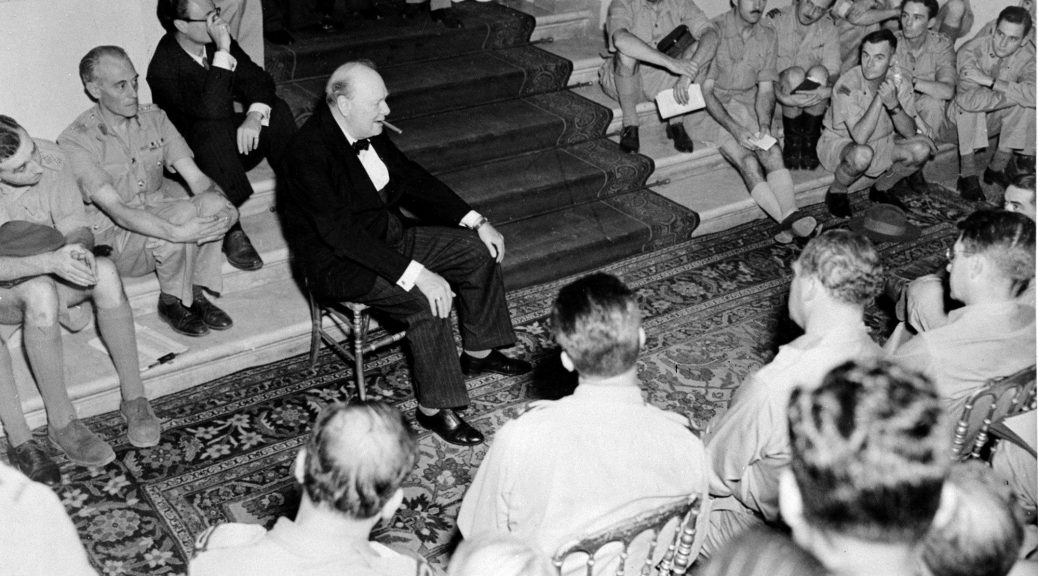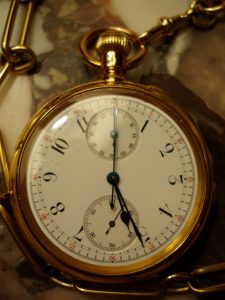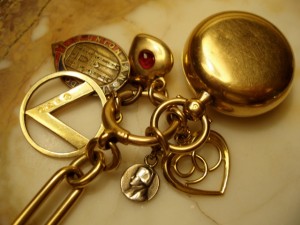
On Time: Winston Churchill’s Pocket Watch and Wristwatch
A wristwatch that the Commune de Vaud gave Churchill on 11 September 1946 was sold recently by Sotheby’s. Did he wear wristwatches? One almost always sees him with a pocket watch. —S.R., New Hampshire
From the 1890s until the end of his life Churchill carried his father’s pocket watch, nicknamed “The Turnip.” He did however sometimes wear a wristwatch, as the above photo shows.
Wristwatches
William Manchester wrote that the wristwatch was a ”product of trench warfare.” Evidently Churchill thought so. Violet Asquith wrote him on 16 November 1915, as he was about to leave for the front after making his departure speech in the Commons:
Dearest Winston: One line to say I thought your speech quite flawless – I have seldom been more moved – It was a fine and generous speech – How thankful I am you said what you did about that wicked old lunatic. Is there anything you haven’t got for the Front? Compass, luminous wristwatch? Muffler and tinderlighter? If there is any lacuna in your equipment let me fill it. Goodbye and good luck—God bless you—Yours, Violet. [The “wicked old lunatic” was Admiral Fisher.]
He continued to make use of wristwatches at least through World War II.

Pocket Watch
Churchill preferred radio to television and pocket watches to wristwatches. He called his gold Breguet pocket watch “The Turnip.” There are several amusing references to it:
Sarah Churchill, A Thread in the Tapestry, 38:
One day at lunch when coffee and brandy were being served my father decided to have a slight “go” at Professor Lindemann, his scientific adviser] who had just completed a treatise on the Quantum Theory. “Prof,” he said, “tell us in words of one syllable and in no longer than five minutes what is the Quantum Theory.” My father then placed his large gold watch, known as “The Turnip,” on the table. When you consider that Prof must have spent many years working on this subject, it was quite a tall order. However without any hesitation, like quicksilver, he explained the principle and held us all spell-bound. When he had finished we all spontaneously burst into applause.
William Manchester, The Last Lion II, 12:
Even at Chartwell his dilatoriness is a source of distress for both his family and the manor’s staff. Once a manservant conspired against him by setting his bedroom clock ahead. It worked for a while, because he scorned that offspring of trench warfare the wristwatch, remaining loyal to his large gold pocket watch, known to the family as “The Turnip,” which lay beyond his grasp. After his suspicions had been aroused, however, the game was up; he exposed it by simply asking morning visitors the time of day.
On Time
Roy Howells (WSC’s male nurse), Churchill’s Last Years, 20-21:
We tried all kinds of ruses to get him out of bed in time and one of them was putting forward every clock in his bedroom. We tried this too often however and eventually he became wise to it. I spotted him one day checking the bedroom clocks against his pocket-watch. In an attempt to beat this manoeuvre I countered by putting his pocket-watch on ten minutes when he was not looking. Still he was suspicious. He used to win in the end by asking someone entering the room, no matter how many clocks he had around him, “Uh-huh, what time is it?” The person naturally told the truth and we were back where we started.
Edmund Murray, Churchill’s Bodyguard, 85:
The morning passed in much the same way as the previous afternoon. As one o’clock approached I looked at my watch. “It’s one o’clock, sir,” I said, “time for lunch.” With great deliberation he pulled out his pocket watch and consulted it. “No,” he said at last. “It’s only five to one. Why do you wish to rob me of five minutes of my life?” “Sorry sir. My watch must be fast … but lunch is at one.”

Churchill’s Breguet
“The Turnip,” Sir Winston’s Breguet, is still in perfect working order. It is in the possession of his great-grandson Randolph, whose late father described it.
It is attached to a heavy gold waistcoat-chain which, at the end has a small round gold case for holding gold Sovereigns, a V for Victory emblem (similar, we believe, to one WSC gave the members of his Wartime Cabinet in 1945), a silver head of Napoleon (of whom he was a great admirer), a keepsake medallion of the (Westminster) Abbey Division by-election of 1924 (which WSC lost by just forty-three votes), a garnet-stone set in a gold heart (the gift of his wife Clementine on their wedding day in September 1908) and another golden heart, which Clementine gave Winston on his 90th Birthday, after fifty-six years of marriage and less than eight weeks before his death.
Reader comments
N.B.: This is a revised, extended version of a 2009 post, which received the reader comments noted below.
***
Response: What you see attached to the ring in the lower photo is not a watch but a small round gold case for holding gold Sovereigns (see last paragraph). But Breguet recently sponsored a London Churchill dinner and “the Turnip” is pictured in the program. The pocket watch’s reverse bears the Spencer-Churchill coat of arms and is very old; perhaps Breguet didn’t put their name on all the faces. —RML
***
John, 17 April 2012:
I have Young Man In A Hurry by Ted Morgan. Found him hard to read. Consider him a revisionist. Morgan is very negative about Churchill.
Response: I found it “fair and balanced.” Morgan is an honest critic, unlike some of the dishonest ones. My annotations from the Zoller bibliography of books about Churchill, available online from the Hillsdale College Churchill Project:
Churchill: Young Man in a Hurry 1874-1915. New York: Simon & Schuster, 1982, 608 pp. Churchill: The Rise to Failure 1874-1915. London: Jonathan Cape, 1983. An exciting and learned work on the period, especially thorough on the Dardanelles attack, which cost Churchill the Admiralty. Handsomely bound with illustrated map endpapers. Although Morgan projected two more volumes he was unable to convince his publisher to accept them; a shame, because this is a well written, deftly argued work. —RML







Two different watches are shown in this article. The one at the top with subdials is keyless and lacks Breguet’s characteristic hands. The other at the bottom has a plain pendant and associated chain. Are they both by Breguet, or just the lower one, and which of these was worn by Churchill?